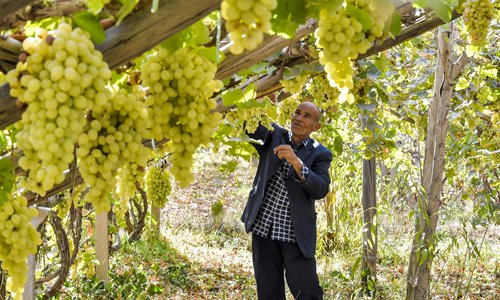HOME >> CHINA
China makes final sprint in battle to end poverty
By Hu Yuwei and Zhao Yusha Source:Global Times Published: 2019/10/17 23:23:40

Government efforts to rid China of extreme poverty by 2020 makes 2019 a crucial year, according to Chinese experts and officials interviewed Thursday who expressed optimism that the ambitious goal will be achieved based on the nation's proven track record in tackling the issue.
Xi Jinping, general secretary of the Communist Party of China (CPC) Central Committee, also Chinese president and chairman of the Central Military Commission, hailed the progress made in poverty relief under the leadership of the CPC on Thursday, the Xinhua News Agency reported.
Xi's instructions were conveyed at a commendation meeting and awards ceremony on poverty alleviation held Thursday morning in Beijing, which honored 140 national pioneers and advanced workers and institutions for their efforts in reducing poverty.
By the end of June, more than 770 people had lost their lives in poverty alleviation jobs nationwide, according to China's State Council Leading Group Office of Poverty Reduction and Development.
The year 2019 marks a significant year for winning the tough battle against extreme poverty as China has set the target to reduce the rural poor by more than 10 million this year, said the experts.
"It is a year that governments at all levels attach great importance to, because we have entered the final sprint to achieve our goals, which are also the foundation project for completing the building of a moderately prosperous society in all respects," Song Guiwu, a professor at Gansu's Provincial Party School, told the Global Times.
China lifted 740 million people in rural areas out of extreme poverty between 1978 and 2017, or about 19 million people a year, according to the National Bureau of Statistics.
The country has lifted another 30 million people out of abject poverty, according to the figures.
Innovative measures
Exporters noted that poverty relief work was focused on the nation's western and ethnic minority groups, who mainly dwell in mountainous regions with an adverse natural environment and backward infrastructure.
In recent years, governments in poor regions have promoted innovative and environmentally friendly ideas to help residents shake off poverty, developing industries such as tourism and e-commerce, Yu Shaoxiang, an expert on social security and poverty relief legislation at the Chinese Academy of Social Sciences in Beijing, told the Global Times.
Chinese short video app Douyin reported in 2018 that 25 percent of the top 100 most-clicked short videos was shot in ethnic minority places, where economic development lags behind other parts of the country.
As tourists poured to places with beautiful scenery and exotic characteristics, they became hits on short video platforms and brought job opportunities, said Yu.
Many individuals in those places use the internet to sell home crafts and specialties. Xinhua reported that more than 5 million people from nationally designated poor counties benefited from promoting and selling their products on Kuaishou, another short video app.
A celebrity nicknamed "Taipingge" never dreamed of one day earning 4.5 million yuan ($0.67 million) a year on the Kuaishou app.
Taipingge grew up in a large family in Inner Mongolia where he used to work odd jobs that earned him about 300 yuan a day.
But when Taipingge posted videos of hometown barbecues on Kuaishou, they went viral.
He began selling beef nationwide in 2017 and now his whole family and even neighbors are participating in the successful business.Big data and artificial intelligence have also played a role in China's poverty relief. Southwest China's Guizhou Province started using big data for precise poverty-relief in 2015. A cloud computing platform was developed which tracks and manages the financial status of more than 6 million poor residents across 9,000 villages, Xinhua said.
Some schools in Xichang, capital of Liangshan Yi Autonomous Prefecture of Southwest China's Sichuan Province have installed an "intelligence campus" system, where students can attend online classes, noted Hou Xuan, a primary school teacher from the city of Xichang. They share libraries and other teaching resources with top-notch schools in Sichuan, Hou said.
The impoverished population of eight ethnic minority provinces and autonomous regions dropped from 31.21 million in 2012 to 6.03 million in 2018, and the poverty incidence dropped from 20.8 percent to 4 percent, Xinhua reported.
Future efforts
All regions and departments must stick to poverty relief goals and make continuous efforts to tackle extreme poverty, improve weak links in compulsory education, basic medical care, housing and drinking-water safety for the impoverished population, and ensure that all rural poor can be lifted out of poverty and step into a moderately prosperous society by next year, Xi said.
Yu noted that China's poverty alleviation efforts will not halt after the goal set for 2020 is reached.
The population in poverty will still exist in China and the Chinese government will continue the work, Yu said.
Even as basic extreme poverty is eradicated, there will be relative poverty in different sections of society, which will need to be addressed, he said.
Some scholars are discussing social relief and aid projects to help those who still can't shake off poverty after 2020.
The government will focus on those extreme poor groups which for example have lost the ability to work or are suffering from serious diseases, Yu explained.
In the long run, "We (Chinese officials) need to be alert to prevent the problem of those who were relieved of poverty returning to poverty caused by policy reasons," said Luo Zhijun, a standing committee member and director of the Chinese People's Political Consultative Conference 's Committee for Agriculture and Rural Affairs.
Song, the Party School professor, said poverty alleviation was a worldwide struggle. "If China, the world's most populous country, can lift itself out of poverty, its approach will certainly serve as a great model for other developing countries," he said.
Posted in: SOCIETY